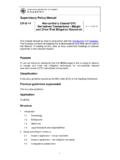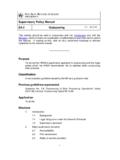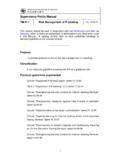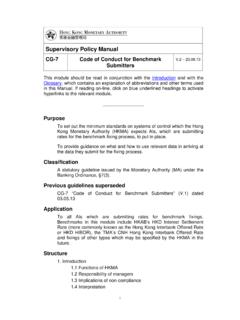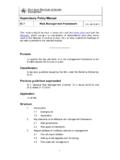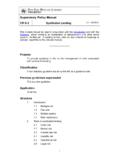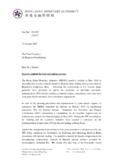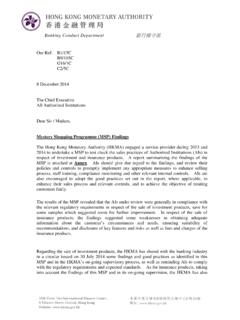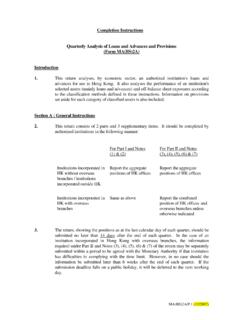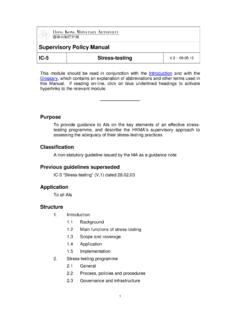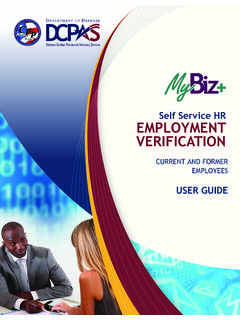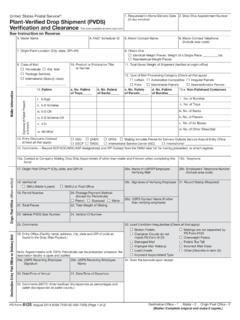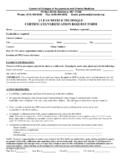Transcription of Guideline on Anti-Money Laundering and Counter …
1 Our Ref.: B10/1C B1/15C 11 October 2017 The Chief Executive All Authorized Institutions Dear Sir/Madam, Guideline on Anti-Money Laundering and Counter -Terrorist Financing address verification Requirements The Hong Kong Monetary Authority (HKMA) and the other relevant authorities (RAs)1 have been reviewing various aspects of the Anti-Money Laundering and Counter -financing of terrorism (AML/CFT) regulatory requirements for financial institutions (FIs)2, which include the address verification requirements stipulated in the Guideline on Anti-Money Laundering and Counter -Terrorist Financing (AML Guideline ).
2 Taking into account feedback from various stakeholders about AML/CFT processes and industry developments, the HKMA and the other RAs have agreed to remove the address verification requirements currently set out in the AML Guideline . As a result, FIs are only required to collect address information of customers and/or beneficial owners without the need to collect documentary evidence for AML/CFT purpose. Relevant paragraphs of the AML Guideline that will be amended to reflect the removal of the address verification requirements are listed in the Annex. Such amendments to the AML Guideline are expected to be gazetted tentatively in the first half of 2018 in conjunction with other revisions3 to the AML Guideline resulting from the passage of Anti-Money Laundering and Counter -Terrorist Financing (Financial Institutions) (Amendment) Bill 2017 (the Bill)4.
3 1 The other relevant authorities are: the Securities and Futures Commission (SFC), the Insurance Authority and the Customs and Excise Department. 2 These financial institutions are: authorized institutions; licensed corporations; authorized insurers, appointed insurance agents and authorized insurance brokers carrying on or advising on long term business; and licensed money service operators. 3 The Bill includes the proposal to amend the requirements in relation to wire transfers, so consequential amendments will also be made to Chapter 10 of the AML Guideline , including relevant address verification requirements.
4 4 The Bill is being scrutinized by the Legislative Council. - 2 - In the meantime, any absence of verification of address (as otherwise envisaged by paragraphs in the Annex) will be regarded by the HKMA and the other RAs as justified under paragraph of the AML Guideline . Authorized Institutions (AIs) may start reviewing and adopt the changes as soon as it is practicable to do so. It should be noted that some AIs may, under certain circumstances, still require address verification from a customer for other purposes ( group requirements, other local or overseas legal and regulatory requirements5).
5 In such circumstances, AIs should communicate clearly the reasons of requiring verification of address to the customer. If you have any questions relating to this letter, please contact Ms Sophia Lam at 2878 1356 or Mr Gavin Cheung at 2878 8305. Yours faithfully, Meena Datwani Executive Director (Enforcement and AML) Encl. 5 For example, Registered Institutions should pay attention to paragraph of the Code of Conduct for Persons Licensed by or Registered with the Securities and Futures Commission (Code of Conduct, the Client Identity Rule).
6 Annex Summary of relevant paragraphs of the AML Guideline that will be amended AML Guideline Reference Current Requirements Proposed Changes Customers Individual (Paragraph ) An FI should obtain and verify the residential address (and permanent address if different) of a direct customer with whom it establishes a business relationship as this is useful for verifying an individual s identity and background. FIs are required to collect residential address1. Customers Trust (Paragraph ) For avoidance of doubt, it is the trustee of the trust who will enter into a business relationship or carry out a transaction on behalf of the trust and who will be considered to be the customer.
7 The address of the trustee in a direct customer relationship should therefore always be verified. FIs are required to collect the address of the trustee. Customers Corporation (Paragraph ) An FI should obtain and verify the following information in relation to a customer which is a corporation: (a) full name; (b) date and place of incorporation; (c) registration or incorporation number; and (d) registered office address in the place of incorporation. If the business address of the customer is different from the registered office address in (d) above, the FI should obtain information on the business address and verify as far as practicable.
8 FIs are required to collect the registered address and principal place of business. Customers Corporation (Paragraph (c)) FIs should verify the company s registered office address in the place of incorporation. To be repealed Beneficial owners (Paragraph ) For beneficial owners, FIs should obtain the residential address (and permanent address if different) and may adopt a risk-based approach to determine the need to take reasonable measures to verify the address , taking account of the number of beneficial owners, the nature and distribution of the interests in the entity and the nature and extent of any business, contractual or family relationship.
9 FIs are required to collect the residential address of beneficial owners1. 1 Besides, FIs are no longer required to collect and verify permanent address of a natural person customer and beneficial owner. Other connected parties (Footnote 34 High risk situations) Consideration might be given to obtaining, and taking reasonable measures to verify, the addresses of directors and account signatories. To be repealed Delay in identity verification (Footnote 16) The same principle applies to the verification of address for a direct customer; an example of a reasonable timeframe being 90 working days.
10 To be repealed verification methods (Paragraphs ) Methods for verifying residential addresses may include obtaining: (a) a recent utility bill issued within the last 3 months; (b) recent correspondence from a Government department or agency ( issued within the last 3 months); (c) a statement, issued by an authorized institution, a licensed corporation or an authorized insurer within the last 3 months; (d) a record of a visit to the residential address by the FI; (e) an acknowledgement of receipt duly signed by the customer in response to a letter sent by the FI to the address provided by the customer.
